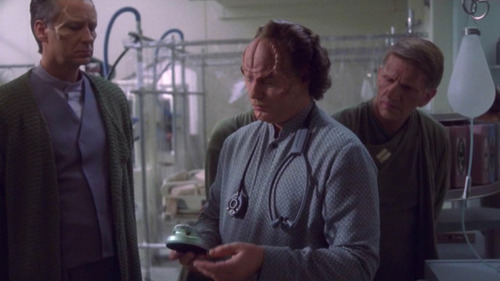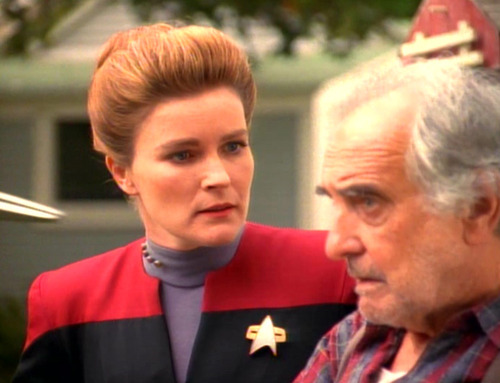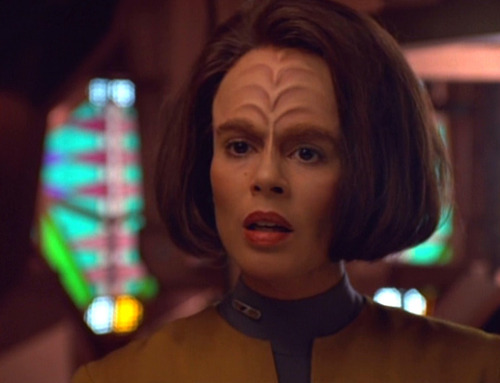It’s almost always more fun to write about the Star Trek episodes that send a problematic message about women or gender roles. But right now I feel like I really need to write about something positive – so I went for a positive Trek depiction of what it means to be a man.
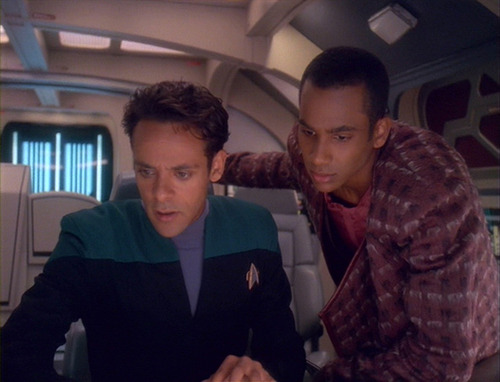
Jake and Bashir are coming back to DS9 after a medical conference Jake is writing an article on Doctor Bashir, and so far, Jake thinks it’s hella boring. As Bashir talks animatedly about the quantum resonance of anomalous proteins, Jake looks about ready to beam himself into space. He wants stories about “life and death, good and evil.”
But then they get a call to help a Federation colony besieged by Klingons on Ajilon Prime, and Jake sees the opportunity he’s been waiting for. Although Bashir is reluctant to take Jake into danger, Jake’s excited about going to help and being able to write about “surgery under fire” instead of medical technobabble.
At this point Jake is expressing a pretty recognizable stereotype of adolescent masculinity. He doesn’t see the danger or risk or excitement in Bashir using his intellect to fight disease; he wants the fighting to be tangible. He’s excited about observing a dangerous situation and doesn’t think it will affect him personally.
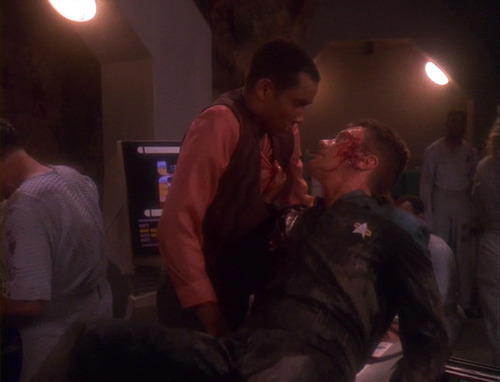
It’s not long before he sees it will. Arriving on Ajilon Prime, Jake and Bashir are immediately thrust into a triage situation. He’s pretty much stunned and you can see how hard it is to come to grips with all that’s happening around him, from the man slumped against the wall and left to die because he’s too far gone, to the other man who grabs Jake’s shirt and insists vehemently he did not shoot himself in the foot.
He’s soon put to work helping to move patients and bodies. And everything he sees is harder and harder to deal with.
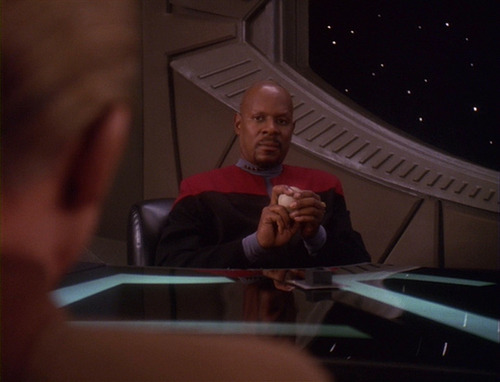
Back on the station, Odo goes to talk to Sisko and I really like this scene because you have two men, including the usually-stoic Odo and Sisko, a father and commander, talking about feelings.
Odo: You’re worried about Jake. I’m sure that Doctor Bashir is looking after him.
Sisko: It seems just yesterday he was five years old, clinging to me because he’d just scraped his knee and I was the only one in the world who could make it better. I remember sometimes getting up in the middle of the night and slipping into his room just to make sure he was all right, and I’d sit there and watch him sleep. And I’d think to myself that no matter what, I wasn’t going to let anything bad happen to this child. Now he’s a sector away in a war zone, and there’s nothing I can do to protect him.
Odo: Try not to worry, Captain. It won’t do you or Jake any good.
Sisko: Can’t help it. It comes with the territory.
Odo: But Jake is eighteen years old. Does your father still worry about you?
Sisko: All the time.
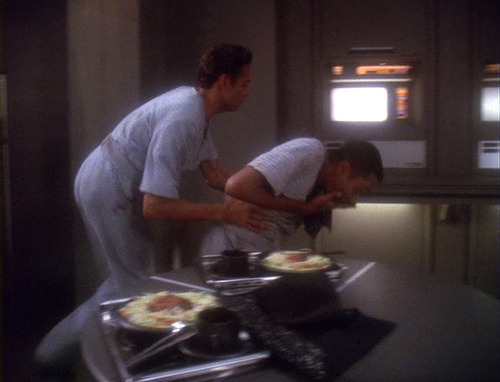
Jake’s first day on Ajilon Prime ends with needing to run out to throw up after Bashir makes a macabre joke about doing surgery on his dinner.
Later, he asks Bashir how Starfleet officers who spent hundreds of hours in battle simulations could get scared and run from battle, or shoot themselves in the foot. Bashir says: “Simulations can’t prepare you for the real thing”. He also counters Jake when he says you can’t know what you’re made of until you’ve been in battle.
Well, let me tell you, Jake. There are plenty of situations in life which test a person’s character. Thankfully, most of them don’t involve death and destruction.
Jake has trouble sleeping and writes in his journal that all he can think about is how close the Klingons are. But soon he has to go with Bashir on a dangerous mission to go through the battle zone the portable generator from the runabout.
Being familiar with our culture’s narratives about men behaving “heroically” (read: bravely, stoically, ready to be killed if need be) in battle you might expect Jake is going to find his confidence and be important to the success of this mission.
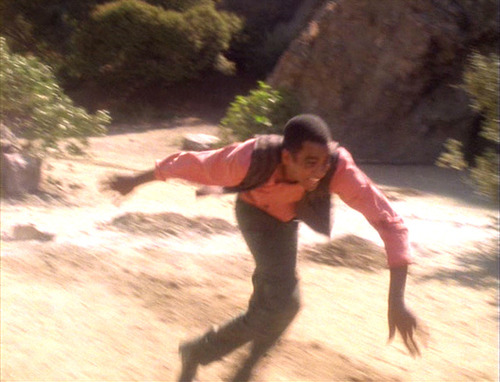
Instead, not long after they’re out of the caverns, shelling starts, and Jake runs blindly away from Dr. Bashir.
He stumbles over a ridge and gets punched by a wounded Starfleet officer. When he comes around, the officer demands his help moving so he can die looking at the sky. This soldier stayed behind purposefully and sacrificed himself so his platoon could escape and he is not happy with Jake.
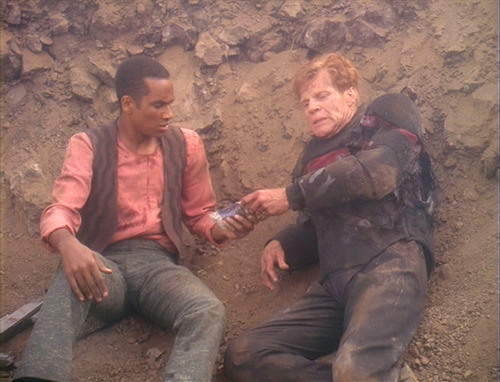
Burke: The doctor. You left him.
Jake: It was a mistake.
Burke: That’s what you call it.
Jake: I didn’t mean for it to happen.
Burke: And now you think bringing me back is going to make everything all right. Sorry, kid. Life doesn’t work like that.
Jake watches him die before fleeing.
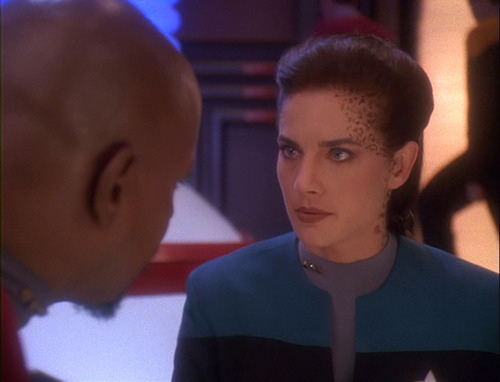
The Defiant is now on its way to Aijlon Prime and we get another great Sisko scene where Dax empathizes with his need to keep busy to avoid being consumed with worry about Jake:
Dax: I wish there was something I could do, some way I could promise you that everything is going to be okay.
Sisko: But you can’t. No one can.
Dax: I know what it’s like to worry about a child. Raifi put Tobin through hell. When Neema was six, she came down with Rugalan fever. Audrid spent two weeks in the hospital with her, never left her side. It was hundreds of years ago. I still remember how helpless I felt. I read her all seventeen volumes of Caster’s Down the River Light, even though I knew she couldn’t hear me. It made me feel like I was doing something, that we were still connected. It wasn’t until much after that that I realised that I was doing it as much for me as I was doing it for her.
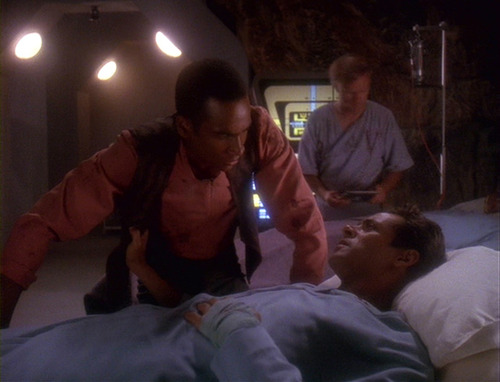
Jake gets back to the compound and feels even guiltier when he finds out Bashir is injured and that he feels guilty for leaving Jake.
Jake: (voice-over as if writing in his journal): I keep turning it over in my head. The shelling, losing sight of Bashir, running, and I keep trying to make sense of it all, to justify what I did. But when it comes down to it, there’s only one explanation. I’m a coward. Part of me wishes Bashir had seen me run away and told everyone the truth. They deserve to know what I am. They should know they can’t count on me. That if the Klingons attack, I’ll run and hide just like I did before.
The guilt eats at him and he lashes out at the other young man he’s working with when he hears him talking about the Klingon’s decapitating their victims.
You think this is some joke. It’s not. People are dying! It’s all so stupid. This whole stupid war is such a waste. In ten years, no body’s going to remember what anybody did here. Maybe you saved a hopper full of people. Maybe you shot yourself in the foot. No one’s going to remember!
Bashir takes him for a walk and tries to get him to say what’s wrong, but Jake tells him to go away. Bashir tells him if he needs to talk, he knows where to find him, and when he leaves, Jake breaks down and cries.
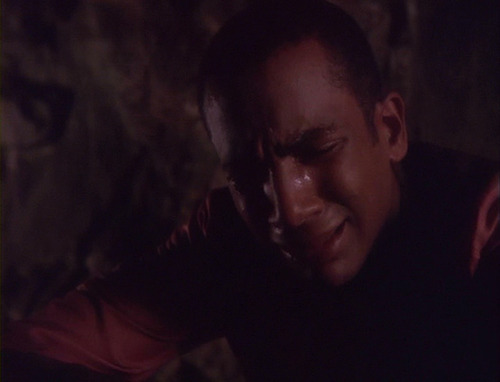
He’s interrupted when the Klingons actually do start attacking the compound. Everyone begins evaucating the compound, and you might think Jake’s about to prove himself wrong but he keeps acting out of fear, standing almost paralyzed, wincing at every shell blast. In the end he hides under a table and when the Klingons come and kill the others in the room, he grabs a phaser rifle and wildly shoots it in every direction, collapsing the ceiling.

Jake wakes up to find his father and Dr. Bashir standing over him. Bashir tells him he’s a hero for taking the risk to bring the ceiling down and stopping the Klingons following them. This time, he can’t let that sit.
Back on the station we hear his voice-over as Sisko and Bashir read his take on what really happened.
More than anything, I wanted to believe what he was saying. But the truth is, I was just as scared in the hospital as I’d been when we went for the generator. So scared, that all I could think about was doing whatever it took to stay alive. Once it meant running away, and once it meant picking up a phaser. The battle of Ajilon Prime will probably be remembered as a pointless skirmish, but I’ll always remember it as something more. As the place I learned that the line between courage and cowardice is a lot thinner than most people believe.

Sisko’s response:
Anyone who’s been in battle would recognise himself in this, but most of us wouldn’t care to admit it. It takes courage to look inside yourself and even more courage to write it for other people to see. I’m proud of you, son.
I vividly remember watching this episode as a pre-teen, and that it really spoke to me. I could imagine myself in Jake’s position and reacting pretty much the same way. Now, when I watch, what I see even more is the message this episode sends to boys and men, pushing the boundaries of what it means to be a man.
Masculine stereotypes say men can and should prove their masculinity through violence. “Nor the Battle to the Strong” says a test of character can come in many forms. Masculine stereotypes say it’s not manly to express emotions, particularly sadness and fear. “Nor the Battle to the Strong” – through both the many scenes with Jake and the two significant scenes with Sisko talking about his fears – says those emotions are natural human reactions and it is actually brave to talk about them.
I have two final thoughts on other points before I close off this review:
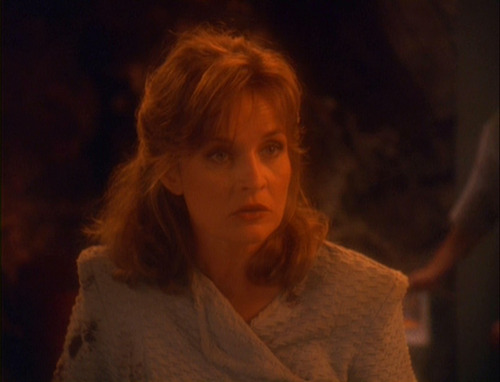
1. I really liked the character of Dr. Kalandra, the doctor in charge of the compound on Ajilon Prime. Karen Austin does a great job showing her as super competent and on top of things but also clearly a human with feelings she’s trying hard to hold in check, under the strain of a terrible situation.
2. There’s a super-annoying Kira pregnancy scene at the beginning of this episode that I can’t fail to mention. It’s supposed to be funny but again trades on tired gender stereotypes – unfortunate when the rest of the episode is challenging them. So O’Brien has asked Quark to formulate decaffeinated raktajino for Kira, because even though Dax says Kira has maybe two rajtajinos a day, O’Brien says: “I just don’t want my son to be born with a caffeine habit.” Dax jokes that “pregnancy always makes men hysterical”. And then it turns pretty much into a battle of the sexes, with a clear gender line drawn.
Dax: It’s not up to you to tell Kira what she can and cannot do.
Worf: She is carrying his child, he should have some say.
Quark: As the lessee, he does have certain rights. Back home, pregnancy is considered a rental.
Kira and Dax: Rental?

And all the men just stare back at them like, “So?” Even Odo! #headdesk
Again, I know we’re supposed to laugh this off, but why is it funny that almost all the main male characters on the station think a man should have property rights over a woman’s uterus? Maybe if we didn’t have any real life examples of that attitude causing harm today, that would make it easier to swallow.
Bechdel-Wallace Test: Fail








